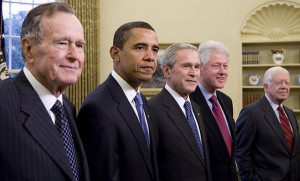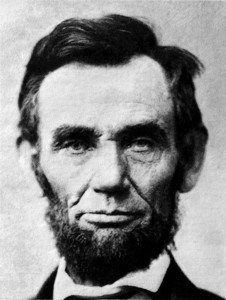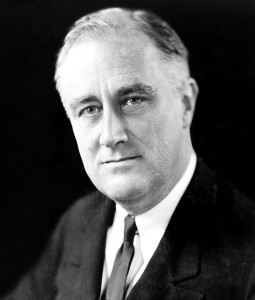
As we approach November, with presidential candidates jockeying for our support, civil rights and civil liberties advocates have reason to be concerned. Last month, Donald Trump suggested a desire to “broaden” the laws to allow torture. After the Brussels attacks, Ted Cruz stated that he would like to “empower law enforcement to patrol and secure Muslim neighborhoods before they become radicalized.” You might be thinking, “of course there would be concern about candidates like that.” But, at least with these two candidates, the wolves come as wolves. Perhaps we should be more concerned about a wolf that comes in sheep’s clothing. For the disguise of a civil liberties ally may help to normalize and legitimize attacks on civil liberties.
In 2008, it was suggested that Barack Obama would be “our first president who is a civil libertarian.” There was “hope” for the Obama Administration and a belief that we would see “change” from the civil liberties attacks under the Bush Administration. Obama appeared to be an ally—a sheep, if you will. Eight years later, some might argue that President Obama’s effect on civil liberties is just as bad, if not worse, than his predecessors (discussed below). Perhaps, he is actually a wolf. You may find that to be a controversial assertion. Bear with me.
I am not suggesting that Obama ran for office with a secret malicious intent to attack civil liberties. Indeed, Obama stated his desire to defend civil liberties. On August 1st, 2007, referring to the Bush Administration, Obama said:
This Administration also puts forward a false choice between the liberties we cherish and the security we demand. I will provide our intelligence and law enforcement agencies with the tools they need to track and take out the terrorists without undermining our Constitution and our freedom.
That means no more illegal wire-tapping of American citizens. No more national security letters to spy on citizens who are not suspected of a crime. No more tracking citizens who do nothing more than protest a misguided war. No more ignoring the law when it is inconvenient. That is not who we are . . .
This Administration acts like violating civil liberties is the way to enhance our security. It is not.
However, six years after making that statement, he seemed to have adopted a more flexible approach to civil liberties:
I think the American people understand that there are some trade-offs involved. I came in with a healthy skepticism about these programs. My team evaluated them . . . I think it’s important to recognize that you can’t have 100 percent security and also then have 100 percent privacy and zero inconvenience. We’re going to have to make some choices as a society.
Maybe the presidency draws a certain type of individual who is susceptible to implementing civil liberties abuses in order to fulfill some of the obligations of the office—sometimes in contradiction to their previously stated policy preferences. Perhaps the nature of the office is such that once an individual becomes president, they more readily curtail civil liberties regardless of their articulated policy preferences.
Presidential Records on Civil Liberties:
Obama is not the first to send mixed messages regarding civil liberties. As Samuel Walker pointed out in his book, Presidents and Civil Liberties from Wilson to Obama, history has demonstrated that the presidents have become “poor custodians of the Bill of Rights.” Walker provides various examples of this poor custodianship: Woodrow Wilson implemented massive violations of free speech, Franklin Roosevelt approved the internment of one-hundred and seventeen thousand Japanese Americans, Harry Truman made guilt by association a national policy under the Federal Loyalty Program, the Reagan Administration had a policy of quiet non-enforcement of civil rights laws, and the events of September 11th ushered in an “unprecedented assault on civil liberties.” The Oval Office, it seems, is frequently a place where civil liberties ideals go to die.


Despite various attacks on civil liberties from the White House, Walker and others point out that among those presidents with poor civil liberties records, there are also examples of civil liberties advances. “Contradictions,” Walker suggests, “may be the norm with respect to presidents and civil liberties.” Lincoln ended slavery, but unilaterally suspended the writ of habeas corpus. Wilson supported Women’s suffrage, but oversaw the Palmer Raids. Truman desegregated the armed forces and civil service, but launched the “Cold War at home.” But when considering the civil liberties advances in our history, we cannot ignore the fact that from John Adams’ Alien and Sedition Acts to Obama’s targeted killing of Anwar al-Awlaki, U.S. presidents have been far from bastions of civil liberties. Even when they look like sheep, they may also act like wolves.
The National Security Justification
A common thread among the various presidential attacks on civil liberties, perhaps the strongest thread, is the national security and wartime justification. A familiar maxim, attributed to Cicero and referenced by both the Executive Branch and Supreme Court Justices, is that “in times of war, the law falls silent.” And it is here where the Obama Administration brings the greatest cause for concern in the civil liberties arena.
Despite the “hope” we had for “change” back in 2008, what we have seen is an administration that has carried on with many of the policies civil libertarians decried during the George W. Bush Administration. This continuity is described in detail in Charlie Savage’s recent book, Power Wars: Inside Obama’s Post-9/11 Presidency. Some have gone as far as to argue that the Obama Administration has embraced national security legal theories that are even broader than those espoused by Bush Administration officials.
The Danger of a Wolf in Sheep’s Clothing
With a president like Obama—once viewed as the “first civil libertarian president”—continuing on with the tragically familiar role of a “poor custodian,” there are two big problems for civil liberties and civil rights advocates.

First, there is a problem of normalization and legitimization. As Savage points out in his book, members of the Obama Administration criticized the Bush Administration’s post-9/11 policies. But there were two strands of criticism: civil liberties and rule-of-law. Often, these critiques were interwoven. The critiques led many to believe that the Obama Administration would be an ally in protecting civil liberties and getting rid of the Bush-era policies. However, Savage points out, a closer look at these critiques shows that many from the Obama team were careful to criticize rule-of-law violations, while leaving civil liberties concerns to be raised by others.
This is a cause for concern because in continuing these post-9/11 policies, the Obama Administration may have the effect of legitimizing and normalizing them. A similar effect can be seen in the Obama Administration’s acceptance of Bush’s preemption doctrine. Professor Jack Goldsmith notes that by essentially embracing Bush’s preemption doctrine, the Obama Administration—viewed as friendly to international law—makes the preemption doctrine “easy to swallow” and gives it “broader acceptance and legitimacy.” Likewise, Obama’s approval (or expansion) of policies with major civil liberties implications (e.g., detention, surveillance, targeted killings) may have a similar effect. This could create a dangerous new “normal.”
The second problem is one of permanence. Civil liberties abuses of the past, like Japanese interment, were abhorrent. But many of these abuses during the Civil War, WWI, WWII, and similar conflicts were, for the most part, finite. They ended when the wars did. Our current “war on terrorism,” however, seems indefinite. Over time, this indefinite war will cause these policies to get “embedded permanently into the political framework, incrementally transforming the political culture and the species of government itself.” It is not clear when the “global war on terror” will end or whether the policies in place will end if the war does. Though at least one court has hinted at the authority to determine, as a factual matter, when “hostilities” have ended. The new risk calculus in the post-9/11 world, and our shift towards a legal and policy framework based on intelligence-led prevention—all of which has been adopted by the Obama Administration—suggest that it is unlikely we will see these policies go away anytime soon. Again, we may be seeing a dangerous new “normal.”
A pattern of civil liberties attacks (including the finality of a targeted killing without a trial), normalized and legitimized by a presumptive civil liberties ally, in a potentially endless war, is a cause for concern. Perhaps we have a wolf in sheep’s clothing. These observations should prompt civil liberties advocates to be painstakingly critical of the current administration and the candidates openly advocating civil liberties abuses. But we should also be critical of candidates who appear to be allies. It may be the allies who have the most harmful impact. Our history has shown that the demands of the presidency have had a detrimental effect on the civil liberties records of those enter that office.
Going Forward
So what can be done? David Cole, at Just Security, suggests that in times of national security crises, when the formal checks on government abuse tend to give great deference to the president, civil society may be the appropriate check on expansive government policies that attack civil liberties. He points out how tactics such as appealing to international allies, pushing the government to acknowledge past wrongdoing, and other alternative forums outside the formal checks and balances, have been successful in restoring some civil liberties in the post-9/11 world. But will this be enough to counter the potential harmful effect that a sheep-turned-wolf would have on normalizing and legitimizing civil liberties abuses? If not, should we expect more of the same—the gradual erosion of civil liberties—regardless of who wins in 2016?
As we evaluate who will be the next President of the United States, we should consider these questions. We should be critical, not just of candidates espousing the intent to attack civil liberties and civil rights, but also of those who presumably will be allies of civil liberties and civil rights advocates—for they may have the most permanent and harmful impact.